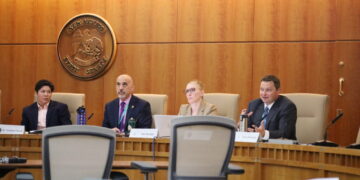(Getty Images)
Problems with the presentation of a Missouri Sunshine Law case, along with misinterpretation of a lower court ruling, doomed the appeal in a closely watched lawsuit over what must be included in a meeting notice and what constitutes a meeting that can be held on short notice.
The Western District Missouri Court of Appeals, in a 2-1 decision handed down Tuesday, upheld Cass County Circuit Judge R. Michael Wagner’s June 2023 ruling in favor of the Western Cass Fire Protection District. In the case, one-time directors Kerri VanMeveren and Darvin Schildknech and an organization called Citizens for Transparency and Accountability accused other board members of numerous violations of the open meetings law.
The lawsuit said the board held meetings without the required 24-hour notice, altered agendas to add non-emergency items and put little to no information on posted agendas about what subjects were up for discussion.
In one instance, for a meeting where other board members tried to oust VanMeveren and Schildknech, there was no indication in the agenda that was to be discussed.
When the appeals court heard arguments in September, Judge Thomas Chapman questioned attorney Jim Layton, representing the plaintiffs, about writing a narrative for an appeal rather than individual point-by-point claims of error in the circuit court ruling. Layton defended grouping the 46 violations by subject.
In his majority opinion, Chapman returned to that question.
“On appeal, plaintiffs continue a trend of attempting to litigate their claims wholesale without providing the court or the opposing party with a clear indication of the claims on which they assert error or the precise nature of their arguments,” Chapman wrote.
The circuit court decision was entered when plaintiffs rested their case during a bench trial. In a dissent, Judge Alok Ahuja wrote that the narrative from Layton followed the points raised in the motion from the fire district seeking the judgment.
The circuit court’s judgment is flawed, Ahuja wrote, because it was delivered without the defense having to present any evidence on claims where the defense bore the burden of proof.
“It was unnecessary for plaintiffs to establish the merit of each individual Sunshine Law violation they alleged, when the adequacy of those claims was never individually challenged,” Ahuja wrote.
In an interview with The Independent, Layton said he would ask the Missouri Supreme Court to hear the case. The narrative presentation was to identify specific legal questions involving multiple incidents, he said.
“Instead of pointing out that there were half a dozen or so legal issues on which the circuit court was wrong, the majority said that we had to break those down into, you know, somewhere between 40 and 60 individual arguments, the vast majority of which would have been redundant,” Layton said.
Aaron Racine, attorney for the fire district, said he’s pleased with the result.
“Obviously, the plaintiffs are entitled to do what they think is necessary in terms of the petition for review,” he said. “And we’ll see what happens going forward.”
The appeal drew the attention of Attorney General Andrew Bailey’s office, the Missouri Press Association and the Freedom Center of Missouri, all of which wrote briefs urging the court to overturn the trial court. The issues involved, they wrote, are some of the most fundamental aspects of what constitutes proper notice of a meeting, how much can be added to an agenda after it is posted, and what information must be presented about an item to be considered.
“All public governmental bodies shall give notice of the time, date, and place of each meeting, and its tentative agenda, in a manner reasonably calculated to advise the public of the matters to be considered,” the Sunshine Law states.
The problems with fire district notices, the lawsuit alleged, were that they often gave the least possible information — such as a resolution number and no other details under the heading “Banking” for a July 20, 2022, meeting.
During the same meeting, while on the agenda item with the heading “reports,” the board adopted changes to the duties of some personnel without any indication that was the intent.
VanMeveren said she was disappointed that the appeal was rejected because of how it was presented rather than the facts.
“It’s very disappointing to be dismissed on a technicality, based on the gravity of what’s at stake here and the disservice it does to the citizens of this community,” she said. “It sends a message to those that try to hold their government agencies accountable, that their ability to do so comes with such great barriers and obstacles.”
The outside briefs noted that there are no court rulings to guide governments on what should be included in a meeting notice to abide by the Sunshine Law.
The ruling did not provide that either, Layton said.
“Missouri remains without any appellate decisions on most of the open meetings questions we addressed in our briefs,” he said.
The fire district continues to include very little information in its notices, despite the lawsuit, VanMeveren said.
“They have not changed their process,” she said, “or how they operate.”
GET THE MORNING HEADLINES.
This post was originally authored and published by Rudi Keller from Missouri Independent via RSS Feed. Join today to get your news feed on Nationwide Report®.




























